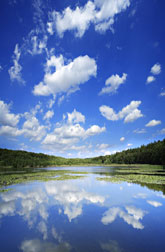|
What are Greenhouse Gases
Greenhouse gases play an important role in the regulation of the Earth's
energy balance.
Greenhouse gases basically consist
of water vapour, carbon dioxide, methane, nitrous oxide, ozone and CFC's.
The natural greenhouse effect is a
warming process whereby the greenhouse gases in the atmosphere trap the
infra red heat that is trying to escape back into space.
The greenhouse gases then raise
the temperature of the lower atmosphere and the Earth’s surface. During the last 200 years, the atmosphere
has become increasingly polluted by man. These
increased greenhouse gases have enhanced the natural greenhouse effect,
contributing to global warming.
The amount of carbon dioxide (CO2)
in the atmosphere has increased by 35% since the Industrial Revolution,
which began in the 18th century, The actual concentration of CO2
infact is now higher than at any point in the past 650,000 years.
What are the Greenhouse Gases
The Earth's greenhouse effect is
based on the concentration of a few greenhouse gases in the atmosphere.
Water Vapour creates the most
global warming but generally is not directly influenced by human
activity.
These are the greenhouse gases
that can be attributed to human activity:
• Carbon dioxide (CO2). The burning of fossil fuels such as coal, oil
and gas is the main source of carbon dioxide emissions with
deforestation making a significant contribution. CO2 accounts for 75% of
the warming effect from human created greenhouse gases.
• Methane (CH4). Accounts for around 14% of human created greenhouse-gas
emissions. The main sources are agriculture, fossil fuel extraction and
the decay of organic waste in landfill sites. Methane doesn't persist in
the atmosphere as long as CO2, though its warming effect is much more
potent for each gram of gas released.
• Nitrous oxide (N2O). Accounts for around 8% of the warming impact of
current human greenhouse-gas emissions. Key sources include agriculture
(especially nitrogen-fertilised soils and livestock waste) and
industrial processes. Nitrous oxide is even more potent per gram than
methane.
• Fluorinated gases ("F gases"). Account for around 1% of the warming
impact of current human greenhouse-gas emissions. Key sources are
industrial processes. F-gases are even more potent per gram than nitrous
oxide.
Human activity also changes the planet's temperature in other ways. For
example, vapour trails from planes, soot from fires and and tropospheric
ozone created indirectly by local pollution all tend to increase
warming. On the other hand, aerosol particles produced by some vehicles
and industrial processes tend to bounce sunlight away from the earth,
temporarily counteracting some of the warming caused by man-made
greenhouse gases.
Why greenhouse
gases have increased
There are 3 important ways that Human activity is changing the amount of
greenhouse gases in the atmosphere:
1. Rain Forests are being cut
down
Trees absorb carbon dioxide so with fewer trees more carbon dioxide
builds up in the atmosphere. Also the agriculture and industry that
replaces the forests can often be a source of emissions. The
Intergovernmental Panel on Climate Change (IPCC) estimates that
deforestation produces 5.9 billion tonnes of CO2 per year or 18 per
cent of global CO2.
2. Fossil fuels are being burned
Burning fossil fuels like coal, oil and gas to generate heat
or to power transport for example, releases greenhouse gases. In
2005, burning fossil fuels emitted about 27 billion tonnes of carbon
dioxide.
3. The world’s population is growing
A growing population is leading to an increased demand for food,
livestock and energy which is in turn leading to increased
emissions.
See also
The Causes of Climate Change
|


![]()
![]()
![]()
![]()
![]()
![]()
![]()

